DESIGN OF MIXED-USE AREA IN LEUWI PANJANG BUS TERMINAL BASED ON TRANSIT-ORIENTED DEVELOPMENT (TOD), BANDUNG CITY, INDONESIA
Abstract
Abstract
Leuwi Panjang Terminal of Bandung City is a terminal with an A-type category in the city of Bandung. This terminal is one of the proposed Transit Oriented Development in Bandung Urban Mobile Project 2031 programs. Listed in the BUMP 2031 program, the Leuwi Panjang Terminal area will be equipped as a public transportation transit, monorail. Based on the existing criteria, the Leuwi Panjang terminal doesn’t fulfill the criteria as a Transit Oriented Development area, including inadequate facilities, the circulation systems that are not mutually integrated and the unavailability of signage makes visitors confused about their activity paths, and the stiffness of pedestrians and cyclists to move around in this area. This study discusses the architectural design recommendations of the TOD area that fill the TOD standards of the Leuwi Panjang Terminal. The method used is by conducting area studies, activity studies, and circulation studies. The study is analyzed and processed to produce a synthesis and application to the design to fulfill the TOD criteria and government regulations.
Keywords: Transit-Oriented Development, Integration, Terminal, Of Bandung City.
Full Text:
PDFReferences
Arofah, W. R., Permana, A. Y., and Mardiana, R. (2019). Implementation of Responsive Architectural Concepts in the Design of the Cikole Forest Resort, Bandung, West Java. Indonesian Journal of Built Environmental and Sustainability, 1(1), 1. https://doi.org/10.31848/ijobes.v1i1.247
Azalia, S. K. (2019). Studi Iklim Mikro Pada Ruang Terbuka Hijau Kawasan Superblok Di Rasuna Epicentrum, Jakarta Selatan.
Bahar, M. A. (2010). High-Tech Architecture: Airport Design: Terminal Penumpang Bandar Udara Komersial Domestik. UIN MALIKI PRESS.
Davies, C. (1989). High Tech Architecture. Thames & Hudson Ltd.
Ernawati, A. (2010). Perencanaan Superblok Sebagai Model Pengembangan Pembangunan Pusat Kota Bekasi. Jurnal Ilmiah Faktor Exacta, 3(1), 54–62.
Forilma, N. F., S, B. S., and Pamungkas, S. T. (2016). Ekspresi Estetika Struktur Pada Stadion Sepakbola Arema Malang. 2, 8.
Ghassani, A. I., Permana, A. Y., and Susanti, I. (2020). Konsep Ekowisata Dalam Perancangan Resort di Kabupaten Ciamis. Jurnal Arsitektur TERRACOTTA, 1(1), 1–11. https://doi.org/10.26760/terracotta.v1i1.3359
Hanafi. (2017). Konsep Penelitian R & D Dalam Bidang Pendidikan. Saintifika Islamica: Jurnal Kajian Keislaman, 4(2), 129–150.
Haryati, S. (2012). Research And Development (R&D) Sebagai Salah Satu Model Penelitian Dalam Bidang Pendidikan. 37(1), 11–26.
Jenks, C. (1988). The Battle Of High-Tech: Great Buildings With Great Faults. London, In Architectural Design.
Kencanasari, R. . V., Surahman, U., Permana, A. Y., and Nugraha, H. D. (2020). Enhancing Community Environmental Awareness Through Indoor Air Quality Workshop. Journal of Architectural Research and Education, 2(2), 165–175. https://doi.org/10.17509/jare.v2i2.30290
Kuhlmann, D. (2011). Biomorphism In Architecture: Speculations On Growth And Form. Springer Berlin Heidelberg.
Permana, A. Y., Akbardin, J., and Nurrahman, H. (2020). Development of Urban Space Based on Student Migrants in Bandung City, Indonesia. Journal of Physics: Conference Series, 1625(1). https://doi.org/10.1088/1742-6596/1625/1/012003
Permana, A. Y., Soetomo, S., Hardiman, G., and Buchori, I. (2013). Smart Architecture as a Concept of Sustainable Development in the Improvement of the Slum Settlementarea in Bandung. Internasional Refereed Journal of Engineering and Science, 2(9), 26–35.
Permana, A. Y., Susanti, I., and Wijaya, K. (2020). Architectural Tourism Development Model as Sustainable Tourism Concept in Bandung. The 1st International Conference on Urban Design and Planning. https://doi.org/10.1088/1755-1315/409/1/012005
Permana, C. S., Permana, A. Y., and Dewi, N. I. K. (2020). Penerapan Konsep Green Architecture dalam Perancangan Hotel Resort di Kabupaten Tasikmalaya. UNDAGI: Jurnal Ilmiah Arsitektur Universitas Warmadewa, 8(2), 82–94.
Permana, A. Y., and Wijaya, K. (2013). Education City As Identity of Bandung City. International Conference on Urban Heritage and Sustainable Infrastrcture Development (UHSID), November 2013, 15–19.
Rahayu, I., Wasilah, and Darmawan. (2017). Arena Olahraga Ekstrim Dengan Pendekatan Arsitektur High Tech Di Makassar. Nature, 4, 39–48.
Setiawan, A., Akbardin, J., & Maknun, J. (2021). Analysis of Demand Potential and Need for Passenger Terminal Facilities at Cikembar Sukabumi Airport. Journal of Architectural Research and Education, 3(1), 67–81. https://doi.org/10.17509/jare.v3i1.32938
Susanti, I. S., Komala Dewi, N. I., and Permana, A. Y. (2018). Tatanan Teritorial dalam Proses Transformasi Hunian. Jurnal Arsitektur ZONASI, 1(1), 27. https://doi.org/10.17509/jaz.v1i1.11542
Wijaya, K., & andermana, A. Y. (2018). Textile Tourism Image as an Identity of Cigondewah in Bandung City Textile Tourism Image as an Identity of Cigondewah in Bandung City. IOP Conference Series: Earth and Environmental Science, 213(1), 012012. https://doi.org/10.1088/1755-1315/213/1/012012
Wisesa, E. Y. (2021). Galeri Sebagai Wadah Potensi Pengembangan Home Industri Di Kawasan Kelurahan Kopo Kota Bandung. Jurnal Arsitektur Zonasi, 4(1), 153–163.
Yazid, S., Permana, A. Y., Siswoyo, S. (2021). Perancangan kawasan kreatif tekstil cigondewah dengan pendekatan arsitektur organik menggunakan metode konstruksi arsitektur modular. 5(1), 100–109.
DOI: https://doi.org/10.17509/jodie.v1i1.35857
Refbacks
- There are currently no refbacks.
Copyright (c) 2021 Asep Yudi Permana, Firdaus Dwi Putra Rustiandi, Risya Maryam Al Haq

This work is licensed under a Creative Commons Attribution-NonCommercial-ShareAlike 4.0 International License.

This work is licensed under a Creative Commons Attribution-ShareAlike 4.0 International License. Statcounter








